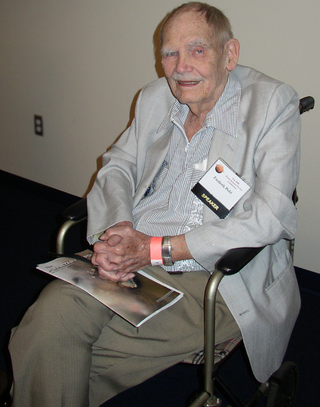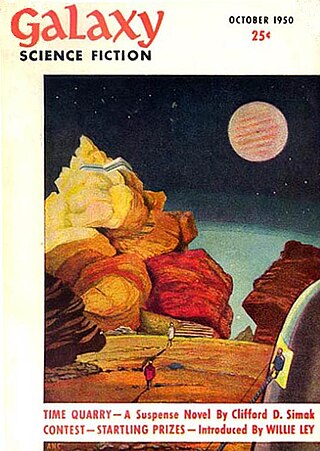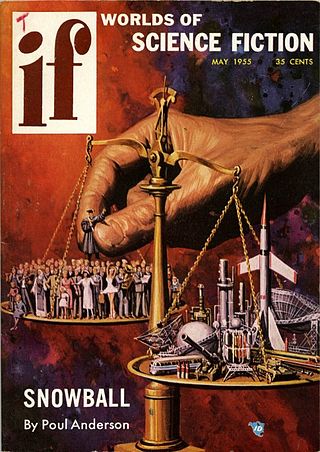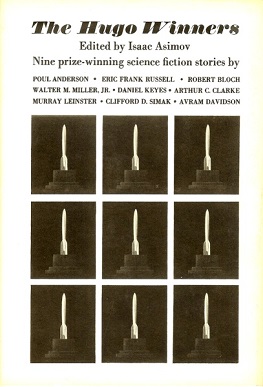Related Research Articles

Cyril M. Kornbluth was an American science fiction author and a member of the Futurians. He used a variety of pen-names, including Cecil Corwin, S. D. Gottesman, Edward J. Bellin, Kenneth Falconer, Walter C. Davies, Simon Eisner, Jordan Park, Arthur Cooke, Paul Dennis Lavond, and Scott Mariner. The "M" in Kornbluth's name may have been in tribute to his wife, Mary Byers; Kornbluth's colleague and collaborator Frederik Pohl confirmed Kornbluth's lack of any actual middle name in at least one interview.

Frederik George Pohl Jr. was an American science-fiction writer, editor, and fan, with a career spanning nearly 75 years—from his first published work, the 1937 poem "Elegy to a Dead Satellite: Luna", to the 2011 novel All the Lives He Led.

Hugo Gernsback was a Luxembourgish–American editor and magazine publisher, whose publications included the first science fiction magazine, Amazing Stories. His contributions to the genre as publisher were so significant that, along with the novelists H. G. Wells and Jules Verne, he is sometimes called "The Father of Science Fiction". In his honor, annual awards presented at the World Science Fiction Convention are named the "Hugos".

Raphael Aloysius "R. A." Lafferty was an American science fiction and fantasy writer known for his original use of language, metaphor, and narrative structure, Lafferty also wrote a set of four autobiographical novels, a history book, and several novels of historical fiction.

Galaxy Science Fiction was an American digest-size science fiction magazine, published in Boston from 1950 to 1980. It was founded by a French-Italian company, World Editions, which was looking to break into the American market. World Editions hired as editor H. L. Gold, who rapidly made Galaxy the leading science fiction magazine of its time, focusing on stories about social issues rather than technology.

If was an American science fiction magazine launched in March 1952 by Quinn Publications, owned by James L. Quinn.

Ted Chiang is an American science fiction writer. His work has won four Nebula awards, four Hugo awards, the John W. Campbell Award for Best New Writer, and six Locus awards. His short story "Story of Your Life" was the basis of the film Arrival (2016). He was an artist in residence at the University of Notre Dame in 2020–2021.

The Seiun Award is a Japanese speculative fiction award given each year for the best science fiction works and achievements during the previous calendar year. Organized and overseen by the Science Fiction Fan Groups’ Association of Nippon, the awards are given at the annual Japan Science Fiction Convention. It is the oldest SF award in Japan, being given since the 9th Japan Science Fiction Convention in 1970.

The Hugo Winners was a series of books which collected science fiction and fantasy stories that won a Hugo Award for Short Story, Novelette or Novella at the World Science Fiction Convention between 1955 and 1982. Each volume was edited by American writer Isaac Asimov, who wrote the introduction and a short essay about each author featured in the book. Through these essays, Asimov reveals personal anecdotes, which authors he's jealous of, and how other writers winning awards ahead of him made him angry. Additionally, he discusses his political beliefs, friendships, and his affinity for writers of "hard science fiction". The first two volumes were collected by Doubleday into a single book, which lacks a publishing date and ISBN.
Algol: The Magazine About Science Fiction was published from 1963–1984 by Andrew Porter. The headquarters was in New York City. The name was changed to Starship in 1979.
The 31st World Science Fiction Convention (Worldcon), also known as Torcon II, was held on 31 August–3 September 1973 at the Royal York Hotel in Toronto, Ontario, Canada.

Masterpieces: The Best Science Fiction of the Century (2001) is a science fiction anthology edited by American writer Orson Scott Card. It contains twenty-six stories by different writers.
Yasumi Kobayashi (小林泰三) was a Japanese author of horror, science fiction and mystery.

The 1974 Annual World's Best SF is an anthology of science fiction short stories edited by Donald A. Wollheim and Arthur W. Saha, the third volume in a series of nineteen. It was first published in paperback by DAW Books in May 1974, followed by a hardcover edition issued in September of the same year by the same publisher as a selection of the Science Fiction Book Club. For the hardcover edition the original cover art of Jack Gaughan was replaced by a new cover painting by Victor Valla. The paperback edition was reissued by DAW in December 1979 under the variant title Wollheim's World's Best SF: Series Three, this time with cover art by Vicente Segrelles. A British hardcover edition was published by The Elmfield Press in October 1975 under the variant title The World's Best SF Short Stories No. 1.

The Best Science Fiction of the Year #2 is an anthology of science fiction short stories edited by American writer Terry Carr, the second volume in a series of sixteen. It was first published in paperback by Ballantine Books in July 1973, and reissued in May 1976.
"The Meeting" is a 1972 science fiction short story by Frederik Pohl, based on an unfinished draft by Cyril Kornbluth. It was first published in The Magazine of Fantasy & Science Fiction; an audio version was read by Bradley Denton.

Nebula Award Stories Two is an anthology of science fiction short stories edited by Brian W. Aldiss and Harry Harrison. It was first published in hardcover by Doubleday in September 1967, with a Science Fiction Book Club edition following in November 1969. The first British edition was published by Gollancz in 1967, under the variant title Nebula Award Stories 1967. Paperback editions followed from Pocket Books in the U.S. in September 1968, and Panther in the U.K. in 1970. The Panther edition bore the variant title Nebula Award Stories 2. The book was more recently reissued by Stealth Press in hardcover in September 2001. It has also been published in German.

New Dimensions II: Eleven Original Science Fiction Stories is an anthology of original science fiction short stories edited by American writer Robert Silverberg, the second in a series of twelve. It was first published in hardcover by Doubleday in December 1972, with a paperback edition under the variant title New Dimensions 2 following from Avon Books in December 1974.
"Unicorn Variation" is a 1981 fantasy story by American writer Roger Zelazny. It was first published in Isaac Asimov's Science Fiction Magazine.
"Press Enter ■" is a science fiction novella by American writer John Varley originally published in the May 1984 issue of Isaac Asimov's Science Fiction Magazine. In 1985 it won the Locus Award for Best Novella, Hugo Award for Best Novella and Nebula Award for Best Novella.
References
- 1 2 My interview with R.A. Lafferty, by Tom Jackson; originally published in Lan's Lantern #39 (1991); published in the Sandusky Register , January 16 2015; retrieved December 17, 2016
- ↑ Eurema's Dam at the Internet Speculative Fiction Database; retrieved December 17, 2016
- ↑ 1973 Hugo Awards Archived 2011-05-07 at the Wayback Machine , at TheHugoAwards.org; retrieved December 17, 2016
- ↑ "星雲賞受賞作・参考候補作一覧" [List of The Seiun Awards Winners & Candidates] (in Japanese). Retrieved 2016-12-17.
- ↑ Gateways to Forever: The Story of the Science-fiction Magazines from 1970 to 1980, by Mike Ashley; published 2007 by Liverpool University Press (via Google Books)
- ↑ Laugh with Lafferty, originally published in SFX #92 (June 2002); archived at Ansible.uk; retrieved December 17, 2016
- ↑ The Golden Age of Science Fiction: The 1973 Hugo Award for Best Short Story: “The Meeting,” by Frederik Pohl and C. M. Kornbluth, and “Eurema’s Dam,” by R. A. Lafferty, by Rich Horton, at Black Gate ; published March 16, 2019; retrieved December 31, 2021